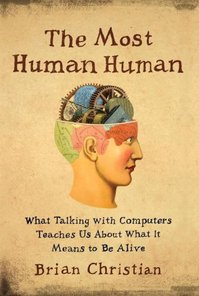Source of book image: http://www.turingfilm.com/wp-content/uploads/2011/03/11-3-18-The-Most-Human-Human.jpg
To be an innovative entrepreneur is to “get out of book” in the language well-expressed below.
(p. A17) In chess, computers are strongest in the parts of the game in which human players rely most on memory: the opening and closing sequences. (Serious players learn strategies by rote, and the early stages of even grandmaster games contain few surprises for the cognoscenti.) Knowledge of these tried and tested moves is called “the book.” By the middle section of a game, however, the number of permutations of moves is too vast for memorization to help. Here players need to get “out of book” and act unexpectedly, which is why computers–even Deep Blue–can struggle.
Mr. Christian elaborates on this distinction and applies it to human intelligence in general. For isn’t it precisely when people refuse to get “out of book”–just following orders or playing their role–that we find them least human? Likewise, when we get “out of book,” we are at our most human. Think of the difference between the waiter who runs through the usual routine and the one who responds to your order with a witticism. Remaining alive to what is mechanical or original in our own behavior can preserve a sense of human difference.
For the full review, see:
JULIAN BAGGINI. “BOOKSHELF; More Than Machine; No computer has yet to pass the Turing Test, fooling judges into believing its responses come from a person.” Wall Street Journal (Tues., MARCH 8, 2011): A17.


